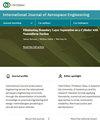Multi-UAV DMPC Cooperative Guidance with Constraints of Terminal Angle and Obstacle Avoidance
IF 1.2
4区 工程技术
Q3 ENGINEERING, AEROSPACE
引用次数: 0
Abstract
This paper studies the salvo attack problem for multiple unmanned aerial vehicles (UAVs) against a maneuvering target, and a guidance scheme based on distributed model predictive control (DMPC) is presented to achieve cooperative interception with constraints of terminal impact angle and no-fly zone (or obstacle) avoidance. Firstly, for guaranteeing the synchronization of UAVs in calculating their acceleration commands, the assumed predictive trajectories are introduced, whose deviation from the actual state trajectories is limited by the designed compatibility constraints. Secondly, based on the velocity-obstacle model, the obstacle avoidance constraints are presented, and for guaranteeing the convergence of impact time and impact angles, the auxiliary controller and terminal ingredients are developed, which complete the design of DMPC cooperative guidance scheme. Subsequently, the rigorous proof for the convergence of the proposed guidance scheme is provided. Based on the above design, a complete implementation process of the guidance scheme is presented, in which each UAV uses the particle swarm optimization algorithm to solve the preprocessed local optimization problem, and only the shared information among neighbors is utilized for calculation. Finally, the numerical simulations are conducted under diverse cases, which demonstrate the effectiveness of the proposed guidance scheme when solving cooperative interception problems with terminal angle and obstacle avoidance constraints.具有终端角度和避障约束条件的多无人机 DMPC 协同制导
本文研究了多架无人飞行器(UAV)对机动目标的礼花弹攻击问题,提出了一种基于分布式模型预测控制(DMPC)的制导方案,以实现在终端撞击角和禁飞区(或障碍物)规避约束下的协同拦截。首先,为保证无人机在计算加速指令时的同步性,引入了假定的预测轨迹,其与实际状态轨迹的偏差受到所设计的兼容性约束的限制。其次,在速度-障碍物模型的基础上,提出了避障约束条件,并为保证撞击时间和撞击角度的收敛性,开发了辅助控制器和终端成分,从而完成了 DMPC 协同制导方案的设计。随后,对所提出的制导方案的收敛性进行了严格证明。在上述设计的基础上,提出了制导方案的完整实现过程,其中各无人机使用粒子群优化算法求解预处理后的局部优化问题,仅利用邻居之间的共享信息进行计算。最后,在不同情况下进行了数值模拟,证明了所提出的制导方案在解决具有终端角和避障约束的协同拦截问题时的有效性。
本文章由计算机程序翻译,如有差异,请以英文原文为准。
求助全文
约1分钟内获得全文
求助全文
来源期刊

International Journal of Aerospace Engineering
ENGINEERING, AEROSPACE-
CiteScore
2.70
自引率
7.10%
发文量
195
审稿时长
22 weeks
期刊介绍:
International Journal of Aerospace Engineering aims to serve the international aerospace engineering community through dissemination of scientific knowledge on practical engineering and design methodologies pertaining to aircraft and space vehicles.
Original unpublished manuscripts are solicited on all areas of aerospace engineering including but not limited to:
-Mechanics of materials and structures-
Aerodynamics and fluid mechanics-
Dynamics and control-
Aeroacoustics-
Aeroelasticity-
Propulsion and combustion-
Avionics and systems-
Flight simulation and mechanics-
Unmanned air vehicles (UAVs).
Review articles on any of the above topics are also welcome.
 求助内容:
求助内容: 应助结果提醒方式:
应助结果提醒方式:


